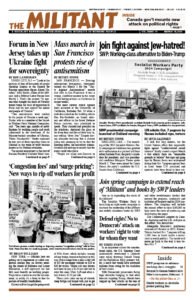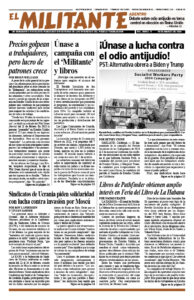Several thousand people turned out for the funeral of Alexei Navalny, a longstanding political opponent of Russian President Vladimir Putin who died in a gulag prison Feb. 16. Participants used the event to express their condemnation of Putin’s regime and its murderous war in Ukraine. They marched from Mother of God Quench My Sorrows Church through Moscow’s streets to the graveyard March 1, chanting “No to war!” and “Russia will be free!”
“There are more than 10,000 people here, and no one is afraid,” one participant, who said her name was Kamila, told Reuters.
Other chants by marchers included “Putin is a murderer!” “Freedom for political prisoners!” and Navalny’s message to supporters, “Don’t give up!”
The government had tried to intimidate people from coming out, issuing threats against “unsanctioned gatherings,” placing surveillance cameras on lampposts and mobilizing large numbers of cops. Students were threatened with expulsion from college if they went.
People were undeterred, some chanting, “Bring the soldiers home!” One woman shouted, “Glory to the heroes,” a pro-Ukraine slogan that was taken up by the crowd. Support for Ukraine is punishable by years in prison.
The funeral became the largest protest against the Kremlin’s war since it launched its invasion two years ago. In other cities — from St. Petersburg to Voronezh — flowers were piled at monuments dedicated to victims of Soviet repression. Although the funeral was blacked out by state media, hundreds of thousands watched online.
Over 100 people were detained in 16 regions, from Moscow to Ekaterinburg and Novosibirsk. When news of Navalny’s death first emerged, over 400 were arrested for laying floral tributes at makeshift memorials.
Putin’s reelection to another six-year term in mid-March is a forgone conclusion. He barred anti-war candidate Boris Nadezhdin from running after 200,000 people had lined up across the country to sign his nominating petition. Nadezhdin attended Navalny’s funeral.
But as the carnage from the war continues to mount, with many more times the number of Russian troops killed than in Moscow’s 10-year war in Afghanistan, Putin’s regime is increasingly nervous about any public display of opposition. Protests by soldiers’ wives and mothers and disaffection among broader layers of working people are growing. Navalny’s widow, Yulia Navalnaya, called for people to protest on election day, March 17. This action had been proposed by her husband, dubbing it “noon against Putin.”

